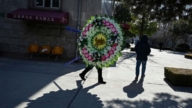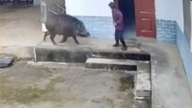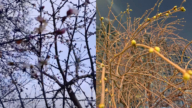【新唐人2011年5月2日讯】中共已故领导人毛泽东孙子毛新宇又出雷人之语。他最近到中国古典名著《水浒传》的发源地——山东梁山,他说,要采用阶级分析的方法,分析《水浒传》梁山招安的问题。他还表示,登梁山让他对“爷爷领导的革命,有了更深刻理解”。舆论反应,毛新宇等于公开承认毛泽东是土匪出身。
梁山县政府办公室信息中心透露,4月 28号,毛新宇,带着妻子刘滨“到梁山考察工作”。作为解放军军科院少将副部长的毛新宇,受到梁山景区工作人员装扮的“梁山好汉 108将”迎接。
当地新闻媒体报导,毛新宇沿着1919年毛泽东登梁山的路线途中,频频表示“一定要向爷爷学习”,并且认识到,中国革命必须建立“根据地”。
当被问到如何对待“宋江招安”的问题时,毛新宇认为,要用阶级分析的方法来对待。他还表示,登上梁山使他对“梁山好汉”的起义方式,有了更为深刻的理解。
毛新宇“登梁山”的言行,引来网民的一片笑声。网民说,不打自招,承认自己的祖辈是土匪出生。还有网友指出,毛泽东本来就是“占山为王、割据一方”的土匪!
那么,毛泽东到底是不是土匪出身呢?
1927年,毛泽东发动的“秋收暴动”,被国民党打败后,他看中了井冈山险峻的地形,就带了残余的七百多人,自任“工农革命军第一司令”,上井岗山当土匪。据记载,他送了一些军火给当地的两名土匪头目袁文才和王佐,成功的在井冈山站稳了脚根,之后他再把这两个土匪头子除掉,毛泽东夺权后控制整个井岗山地区。这个记载,几乎就是《水浒传》上晁盖等七人上梁山泊“落草为寇”的现代翻版了。
郭国汀(原中国人权律师):“毛泽东可以说是从土匪出身的,他的很多作法就是土匪。毛泽东跟朱德汇合以后,在井岗山凭什么吃饭呢?他就是靠所谓打土豪劣绅方式吃饭。那什么叫土豪劣绅呢?也就是地主及地方上的富人,毛泽东的土匪军队就是当时的所谓的红军,就是到处杀人猎货,绑架人质,敲诈勒索。
前北京大学教授、史学家苏明认为,中共是兽性匪类政权。
苏明(史学家):“土匪盗贼们所追求的只有物欲,那就是酒、肉、钱。为了酒、肉、钱,它们不在乎去杀人、抢劫、绑票、强奸、霸占、偷窃。结合到共党前三十年和后三十年的一切所作所为,始终贯穿了这一兽性物欲,土匪大盗的规律行事的,所以把共党这个政权称作为兽性共产匪类政权是一点都不为过的。
据毛泽东自己说,他从少年时代开始,就喜欢读《水浒传》。在他一系列作品中,经常可以看到他引用的《水浒》典故﹔毛泽东认为,《水浒》一书只反贪官,不反皇帝。他还说:“《水浒》这部书,好就好在投降。做反面教材,使人民都知道投降派。”
《水浒传》是中国第一部歌颂农民起义的长篇章回体小说,原名《江湖豪客传》或《水浒全传》,美国记者翻译书名为《四海之内皆兄弟》,作者施耐庵描写了梁山108位好汉们,从起义到兴盛再到最终失败的全过程。
新唐人记者李静、李璐综合报导。
Mao’s Villain Background?
Mao Xinyu, grandson of the former leader
Mao Zedong, again said something ludicrous
while visiting the origin of the famous Chinese
classical novel “Outlaws of the Marsh",
including using class analysis to study the issue
of offering amnesty to rebels. He also said
that this visit intensified his understanding of
Mao’s revolution. Media commented
that his remarks equated to admitting
Mao has a villain background.
Local authorities said on April 28, that Mao Xinyu
and his wife visited Mount Liang, Shangdong,
place of origin of the novel “Outlaws of the Marsh".
As a Major General, Mao Xinyu was greeted
by people mimicking the 108 outlaws in the novel.
Local media said, that Mao Xinyu traced the route
used by Mao to Mount Liang in 1919,
insisting he ought to learn from his grandfather.
He also said that the Chinese revolution required
one to know his or her roots.
When asked how to evaluate the amnesty to rebels,
written in the novel, he said to use the class analysis.
He also stated, that after visiting Mount Liang
he has a better understanding of how rebels fought.
Mao Xinyu’s words sparked laughter amid netizens.
Some said that without being pressed he confessed
that his ancestors originated from villains.
Others pointed out, that Mao Zedong was indeed
a bandit at one time.
But does Mao really have a villain background?
After his Autumn Harvest Uprising was defeated
by KMT, Mao took his 700 remaining soldiers
to Mount Jinggang to become bandits.
Records have it that he bribed
two leaders of the local bandits
with some ammunitions in exchange for his life.
Later, he killed these two leaders
and controlled the entire bandit gangs in the region.
This record of Mao coincides remarkably with
that depicted in the novel “Outlaws of the Marsh".
Guo Guoting, former Chinese lawyer said:
“Mao Zedong can be regarded as originating
from villains, since his deeds resembled
those of bandits. After he got to Mount Jinggang,
how could he survive? He survived by the so-called
“fighting the local tyrants and gentries.”
What does this mean? It is robbing
the local rich people. Mao’s Red Army
indeed kidnapped, robbed and killed
in the Mount Jinggang region in order to survive.”
Su Min, former Beijing University history professor,
said the Chinese authorities are a bandit government.
Su Min: “Bandits pursue materials like wine, meat
and money. For these, they dare to kill, rob, kidnap,
rape, seize and steal. What the Chinese communist
regime did in the first and second 30 years
all came down to what the bandits could have done.
So, it would not be an exaggeration to perceive
the CCP’s regime as a bandit government.”
Mao Zedong once said that he liked to read
this novel when he was young. He often quoted
the novel in his works and said, this novel advocates
opposition to corrupt officials, but not to emperor.
He also said, the quintessence of this novel lays in
the capitulation. It exemplified what surrender was.
“Outlaws of the Marsh", also known
as “Water Margin" or “All Men Are Brothers",
is the first novel by Shi Naian in Chinese literature
that details the entire course of 108 outlaws
from their uprisings, successes and tribulations
during the Song Dynasty.
NTD reporters Li Jing and Li Lu




























